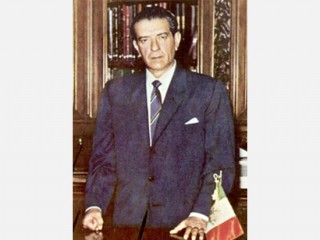
Adolfo López Mateos biography
Date of birth : 1909-05-26
Date of death : 1969-09-22
Birthplace : Atizapán de Zaragoza, State of Mexico, Mexico
Nationality : Mexican
Category : Politics
Last modified : 2010-11-08
Credited as : Politician, former President of Mexico,
Adolfo López Mateos served as president of Mexico from 1958 to 1964, a time in which Mexico was attempting to redefine its national goals. His administration was one of the most successful of the post World War II period.
Adolfo Lopez Mateos was born in the village of Atizapan de Zaragoza in 1910, only a few months before the Mexican Revolution against Porfiro Daaz broke out. After completing his primary and secondary education in Toluca he moved to Mexico City and received his law degree from the National Autonomous University of Mexico. His legal training provided his entree into politics. In 1934, during the presidency of Lazaro Cardenas, he became a regional secretary of the Partido Nacional Revolucionario, the predecessor of today's official party, the Partido Revolucionario Institucional.
Moving from behind the political scene into the limelight he served in the Senate from 1946 to 1952, representing the state of Mexico, and briefly was his country's ambassador to Costa Rica. With the election of Adolfo Ruiz Cortinez as president (1952-1958), Lopez Mateos was brought into the cabinet as minister of labor. His finesse in dealing with labor unrest caused his political stock to rise and ultimately won him the presidential nomination of the Partido Revolucionario Institucional in 1958.
Nomination by the official party was tantamount to election, and he won his nation's highest office with almost 90 percent of the total votes cast. Forty-eight years old when inaugurated, he portrayed the image of a dynamic, efficient, and devoted statesman. More intellectually inclined than his recent predecessors in the presidential office, he indicated early in his administration that he wished to nudge the Mexican Revolution toward the left. When asked by the press to comment on his political philosophy he answered, "I am left within the Constitution." Clearly he intended to reject the conservative, business-oriented policies of past administrations in favor of implementing programs designed to quicken the pace of social reform. This change in orientation did occur.
Land redistribution, almost a forgotten revolutionary goal, was stepped up as Lopez Mateos parcelled out approximately 30 million acres during his six-year term— more than any Mexican head of state since Lazaro Cardenas. Low interest loans and technical training accompanied the redistribution. State intervention in the economy manifested itself in other ways, including government purchase of the controlling stock of a number of foreign industries. U.S. and Canadian electric companies and the motion picture industry fell under government control. Social welfare projects, including low cost housing projects and government-financed medical care and old age pensions, were expanded and social security, under the auspices of the Institute Mexicano de Seguro Social, was extended in rural Mexico. The public health program was especially significant, and the administration was able to drastically reduce instances of polio, tuberculosis, and malaria. In total, federal spending rose over 132 percent from the previous six-year period, but a rapidly growing GNP (Gross National Product) was able to withstand the record expenditures.
In 1962 Lopez Mateos decided to implement an almost forgotten article of the Mexican Constitution of 1917, a provision which called for owners of industries to share their profits with labor. Congress passed the necessary enabling legislation, and in the designated industries committees were established composed of labor, management, and government representatives. The profit-sharing formula was a complicated one, varying from industry to industry depending upon a score of independent variables. By 1964 many Mexican workers were sharing profits amounting to an extra one to ten percent of their annual wages.
The accommodations of the left carried over into Mexican foreign policy during the Lopez Mateos years as Mexico refused to follow the lead of the Organization of American States in isolating Fidel Castro's Cuba. Mexico voted against Cuba's expulsion from the OAS and refused to endorse other economic and political sanctions. But in spite of the contention of his rightist critics, Lopez Mateos did not confuse "left within the Constitution" with "left of the Constitution." He removed the Communist leadership in the teachers union, the railroad workers union, and the rectorates of some provincial universities. He even jailed one of Mexico's muralists, 65-year-old David Alfaro Siqueiros, for organizing a student demonstration in 1960. The uproar from the left was predictable. The president had his critics at that end of the political spectrum as well.
The 1960 Mexican census revealed that there were more illiterates in Mexico in the year of the count than there had been 50 years earlier when the Mexican Revolution broke out. Lopez Mateos earmarked huge budgetary expenditures for education, especially rural education. Part of the renewed effort to curtail illiteracy was the preparation and publication by the government of a series of free and compulsory textbooks for grades 1 through 6. The textbooks caused an uproar throughout the country. The Union de Padres de Familia (somewhat similar to the P.T.A. in the United States), the Barra Mexicana, the Sociedad Mexicana de Autores Escolares, and the Roman Catholic Church all opposed the textbooks on the grounds that the imposition was a totalitarian act designed to standardize the thought of the country's youth. President López Mateos refused to back down, and the books were adopted throughout the country in spite of the protests.
Shortly after he left office in 1964 López Mateos suffered a severe stroke and lay in a coma until death claimed him six years later. At that time he was eulogized as a nationalist who defended Mexican interests in the world community and a humane statesman who identified with the poor and powerless at home.
















